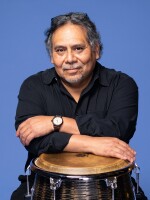
Webcasters and others who transmit music digitally say a recent ruling that raises the royalty rates for online music could put them out of business. The claim comes in the wake of higher royalty rates for Internet radio sites and other groups that stream music online that were recently announced by the Copyright Royalty Board.
The new rates set by the board, a three-judge panel appointed by the Librarian of Congress, are retroactive to last year.
It's unclear how the new ruling might affect the audience for Internet radio, which has grown to a weekly audience of 57 million people, according to one estimate.
Most Webcasters currently pay a royalty rate based on a percentage of ad revenue. The new rates will likely affect not only for-profit companies but also nonprofit public stations that stream their broadcasts.
One site, AccuRadio, offers 12 jazz channels, 7 for electronica, 11 Latin genres and 6 channels dedicated to what the site calls "country twang." In all, there are 320 channels, all of them available for free.
AccuRadio's founder and CEO Kurt Hanson says he makes money by selling advertising time, but the new royalty rate increase would far exceed the revenue that ads bring in.
"This rate hike would absolutely shut us down if it's put into effect," Hanson says. "Our revenues last year were about $400,000. We thought our royalty obligation under the previous deal would have been about $48,000. Our royalty obligation under this new deal would be $600,000."
Under the old royalty system, Hansen and other small commercial Webcasters paid a flat rate of 12 percent of their annual revenue.
Large online companies such as Yahoo and AOL paid royalties based on how many songs were played over a given period of time, or "tuning hour."
But earlier this month, the Copyright Royalty Board, a three-judge panel appointed by the Librarian of Congress, set rates that would apply to all Webcasters.
The new royalty rate is based on a per-song, per-user fee.
A Webcaster determines how many listeners are logged on each hour. Then, they multiply that number by the number of songs streamed in the hour, and multiply that by the royalty rate.
Right now, the rate is only 8/100 of a cent per user per performance.
But a small Webcaster, who may put out a one-hour show that includes 15 songs and gets an average of 300 listeners a week, would have to pay more than $1,800 a year in royalties.
And it's not only the little guys who are upset. Clear Channel Communications, the country's largest commercial radio network, joined a number of other organizations last week in filing motions with the Copyright Royalty Board to ask it to rehear the rate increase issue.
Among those organizations was National Public Radio, which filed a motion for rehearing the issue on behalf of all public radio stations that stream their broadcasts online.
One group that pushed for the higher rates is Sound Exchange, a nonprofit entity created by the Recording Industry Association of America to collect royalties for music played via the Internet, satellite radio and other digital outlets.
John Simson, the president of Sound Exchange, says the market should determine who can afford to stay online.
"Whether you're a corner market versus a big supermarket," Simson says, "you both have to pay the same amount for the milk that you sell. It's not like the little guy gets a cheaper price for milk."
Simson argues that Webcasting is a growing business — and one that musicians should get a share of. Sound Exchange distributes 50 percent of the royalties it collects to record labels. The other 50 percent is divided between featured performers and their backup musicians.
But critics have charged that Sound Exchange is concerned primarily with major labels and their artists — a charge that Simpson denies. He says he is concerned with "fighting to get fair value for our constituents."
Critics say that approach is short-sighted.
Greg Scholl is president and chief executive of The Orchard, a Web-based company that represents artists and labels providing digital music to online retailers. The Orchard collects revenues and royalties for those companies and musicians.
In the long run, Scholl says, the new online royalty rates will hurt his clients.
Aside from the short-term gain of more money, Scholl says, "higher rates means less diversity of programming; it means slower development of the digital music space; and it means more difficult time for independent artists and labels to take advantage of this incredible new medium, which is the Internet, to build audiences and make and sell music."
Webcasters have until April 2 to file motions for a re-hearing with the Copyright Royalty Board.
If the board decides to stand by the current rates, Internet radio and other digital music providers can lobby Congress; some may take their case to the courts. The new rates are set to take effect May 15.
Copyright 2022 NPR. To see more, visit https://www.npr.org. 9(MDAzMjM2NDYzMDEyMzc1Njk5NjAxNzY3OQ001))






